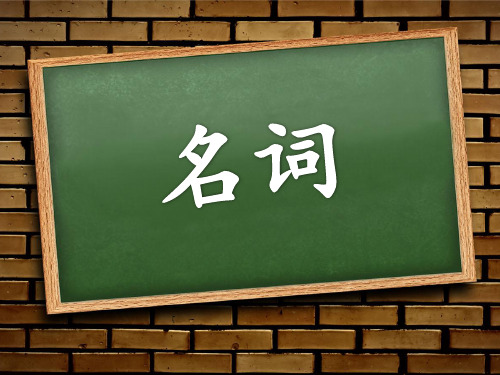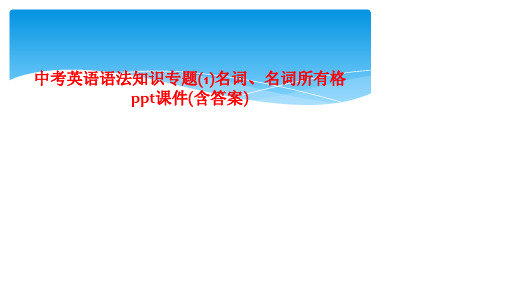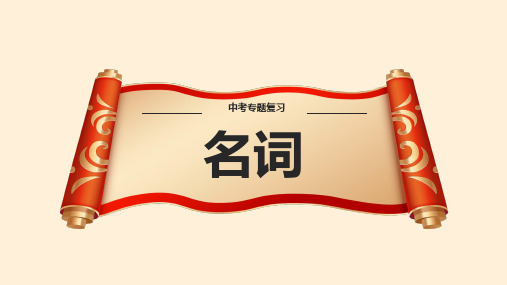中考名词考点(可直接使用).ppt
合集下载
中考英语专题复习名词课件(共30张PPT)

beliefs,roofs,gulfs,chiefs,cliffs
⑵单数变复数的不规则变化。
man-men woman-women child-children
tooth-teeth foot-feet goose-geese
mouse-mice ox-oxen
sheep fish deer Chinese Japanese
man
woman
tooth
men
women
teeth
child children
ox oxen
fish
sheep
fish
sheep
a bag of rice→two bags of rice
a piece of paper→three pieces of paper
不可数名词一 般没有复数形 式,说明其数量 时,要用有关计 量名词。
英语语法基础知识 名词
词的类别
Tom London
France
the World Trade Organization (WTO)
专有名词如果是含有普通名词 的短语,则要使用定冠词the。
如:the Great Wall;
the People’s Republic of China
2. 普通名词是指人、事和物的 名称的。20. babyb Nhomakorabeabies
21. German Germans
22. woman women
23.Frenchman Frenchmen
24. dish
dishes
一双鞋 a pair of shoes 两杯水 two glasses of water 三克金子 three grams of gold 四个西红柿 four tomatoes
⑵单数变复数的不规则变化。
man-men woman-women child-children
tooth-teeth foot-feet goose-geese
mouse-mice ox-oxen
sheep fish deer Chinese Japanese
man
woman
tooth
men
women
teeth
child children
ox oxen
fish
sheep
fish
sheep
a bag of rice→two bags of rice
a piece of paper→three pieces of paper
不可数名词一 般没有复数形 式,说明其数量 时,要用有关计 量名词。
英语语法基础知识 名词
词的类别
Tom London
France
the World Trade Organization (WTO)
专有名词如果是含有普通名词 的短语,则要使用定冠词the。
如:the Great Wall;
the People’s Republic of China
2. 普通名词是指人、事和物的 名称的。20. babyb Nhomakorabeabies
21. German Germans
22. woman women
23.Frenchman Frenchmen
24. dish
dishes
一双鞋 a pair of shoes 两杯水 two glasses of water 三克金子 three grams of gold 四个西红柿 four tomatoes
中考英语语法专项1:名词课件(共46张PPT)

* boy – boys holiday-holidays * monkey – monkeys
(4) 以f、fe 结尾的名词,变f、fe 为v再加 “es” ,读作/vz/
* half – halves * shelf – shelves * knife – knives * leaf – leaves
Mary's and Jane's cars(她俩各自的车)
(4)表示店铺、住宅、公共建筑等地点时,名 词所有格后面的名词习惯上省略。如: the barber's=the barber's shop理发店 to my aunt's=to my aunt's house到我姑姑家 (5)有些指时间、距离、重量、价值、国家和 城镇等无生命的名词,也可以加's构成所有 格。如: a week's time 一周的时间 China's population中国的人口
( D ) 4. When we got to his room, we found three , two and two in it. A. tomatoes; radio; photos B. tomato; radios; photos C. tomato; radio; photos D. tomatoes; radios; photos ( B ) 5. He has four . All of them can brush their by themselves. A. children; tooth B. children; teeth C. child; teeth D. child; tooth
( C ) 6. Here come three . One of them is my math teacher, Mr. Hu. A. man teacher B. woman teacher C. men teachers D. women teachers ( B ) 7. Near our school there are three . You can buy some animal toys for your children. A. toy factory B. toy factories C. paper factory D. paper factories ( A ) 8. A group of are talking with two . A. Frenchmen; Germans B. German; Frenchmen C. Frenchman; German D. Germans; Frenchman
中考英语专题复习——名词 课件(40张PPT)

不可数名词可以用单位词来计量
三、名词所有格
名词所有格の‘s
1. Mike ‘s father
一般情况下在名词词尾加‘s
2. the teachers' room
以s结尾的复数名词加‘
3. Engels’s work=Engels’work
以s结尾的人名后加‘s或’
4. Women’s Day
不以s结尾的复数名词后加‘s
五、名词的辨析
名词的辨析
可数
不可数
job
名词的辨析
短假,节 日
长假
holiday
名词的辨析
家
家庭
房子 建筑
居住的地 方
family
house
home
统指衣服, 上衣,裤 子,内衣
等
名词的辨析
不可数名 词,指布
料
集合名词, 是衣服服 装的统称
clothes
cloth
clothing
旅行或旅 游的总称
四、名词的句法功能
名词的句法功能
定语 主语
状语 宾语
宾补
表语
同位语
名词的句法功能
1. Some boys are playing football in the park. 主语 2. We are discussing the population problem. 定语 3. Edison is a great American inventor. 表语 4. I will see you Saturday. 状语 5. He bought a new jacket last week. 宾语 6. She found him a very good pupil. 宾补 7. Miss Yang, our English teacher, is very young. 同位语
三、名词所有格
名词所有格の‘s
1. Mike ‘s father
一般情况下在名词词尾加‘s
2. the teachers' room
以s结尾的复数名词加‘
3. Engels’s work=Engels’work
以s结尾的人名后加‘s或’
4. Women’s Day
不以s结尾的复数名词后加‘s
五、名词的辨析
名词的辨析
可数
不可数
job
名词的辨析
短假,节 日
长假
holiday
名词的辨析
家
家庭
房子 建筑
居住的地 方
family
house
home
统指衣服, 上衣,裤 子,内衣
等
名词的辨析
不可数名 词,指布
料
集合名词, 是衣服服 装的统称
clothes
cloth
clothing
旅行或旅 游的总称
四、名词的句法功能
名词的句法功能
定语 主语
状语 宾语
宾补
表语
同位语
名词的句法功能
1. Some boys are playing football in the park. 主语 2. We are discussing the population problem. 定语 3. Edison is a great American inventor. 表语 4. I will see you Saturday. 状语 5. He bought a new jacket last week. 宾语 6. She found him a very good pupil. 宾补 7. Miss Yang, our English teacher, is very young. 同位语
人教版英语中考复习:名词专题 (共35张PPT)

kangaroo, photo
11
【策略点播】
• 2. 以f(e)结尾的名词变复数,需要把-f(e)改为v,再加-es常见的有9个, 它们分别是:wife, knife , wolf, thief, shelf, self, life, half, leaf 。
• 可以这样记: 妻子持刀去宰狼,小偷吓得发了慌;(wife,knife , wolf,thief )
如:the Great Wall
3
2.2 普通名词
可数名词
个体名词,表示某类人或事物中的个体 集体名词,表示若干个体组成的集合体
如:pen, worker 如:family, class, team
普通名词 不可数名词
物质名词,表示无法分为个体的物质或实物 如:water, time, air
抽象名词,表示品质、状态、感情等抽象的 如:happiness, honesty(诚
5
注意
• 既可数又不可数的名词,但意义不同。如:
• chicken—鸡(可数); 鸡肉(不可数)
room—房间(可数); 空间(不可数)
• fish—鱼(可数); 鱼肉(不可数)
glass—玻璃杯(可数); 玻璃(不可数)
• paper—试卷,报纸(可数); 纸张(不可数) 数)
time—倍数,次数(可数); 时间(不可
• 2. The team often wins (win) the matches. After winning, the team have (have) a shower.
• ( ) 3. He is ______________ .
• A. an English
B.a Englishman
11
【策略点播】
• 2. 以f(e)结尾的名词变复数,需要把-f(e)改为v,再加-es常见的有9个, 它们分别是:wife, knife , wolf, thief, shelf, self, life, half, leaf 。
• 可以这样记: 妻子持刀去宰狼,小偷吓得发了慌;(wife,knife , wolf,thief )
如:the Great Wall
3
2.2 普通名词
可数名词
个体名词,表示某类人或事物中的个体 集体名词,表示若干个体组成的集合体
如:pen, worker 如:family, class, team
普通名词 不可数名词
物质名词,表示无法分为个体的物质或实物 如:water, time, air
抽象名词,表示品质、状态、感情等抽象的 如:happiness, honesty(诚
5
注意
• 既可数又不可数的名词,但意义不同。如:
• chicken—鸡(可数); 鸡肉(不可数)
room—房间(可数); 空间(不可数)
• fish—鱼(可数); 鱼肉(不可数)
glass—玻璃杯(可数); 玻璃(不可数)
• paper—试卷,报纸(可数); 纸张(不可数) 数)
time—倍数,次数(可数); 时间(不可
• 2. The team often wins (win) the matches. After winning, the team have (have) a shower.
• ( ) 3. He is ______________ .
• A. an English
B.a Englishman
中考英语语法知识专题(1)名词、名词所有格ppt课件(含答案)

中考英语语法知识专题(1)名词、名词所有格 ppt课件(含答案)
名词 (一)名词的分类:名词是表示人或事物名称的词。它分为专有名词和普通名词。
类别
定义
例词
专有名词
表示具体的人名,事物, China,the Great 地名,组织等名称的词。 Wall
可数 普通
名词 不可
数
个体名词 集体名词 物质名词 抽象名词
Lucy with her friends goes (go) to the park every Sunday.
5.表时间、金钱、距离的名词作主语时,视为一个整体,谓语动词用单数。 Ten years is (be) a very long time. 6.常考的不可数名词 room=space 空间;空地 There is no room to put the desk here. news,information,advice,weather,music,pollution, population... 7.exercise 作不可数名词,意为“锻炼”。作可数名词意为“练习;操”。 We should take more exercise.It’s good for our health. Doing more eye exercises is good for our eyesight. To get high scores we should do many math exercises every day.
名词的形容词转换: n.+y rain—rainy cloud—cloudy sun—sunny luck—lucky health—healthy n.+ful use—useful harm—harmful beauty—beautiful care—careful wonder— wonderful thank—thankful n.+less useless care—careless help—helpless n.+ly friend—friendly love—lovely month—monthly n.+n Asia—Asian America—American Australia—Australian n.+en wool—woolen wood—wooden gold—golden
名词 (一)名词的分类:名词是表示人或事物名称的词。它分为专有名词和普通名词。
类别
定义
例词
专有名词
表示具体的人名,事物, China,the Great 地名,组织等名称的词。 Wall
可数 普通
名词 不可
数
个体名词 集体名词 物质名词 抽象名词
Lucy with her friends goes (go) to the park every Sunday.
5.表时间、金钱、距离的名词作主语时,视为一个整体,谓语动词用单数。 Ten years is (be) a very long time. 6.常考的不可数名词 room=space 空间;空地 There is no room to put the desk here. news,information,advice,weather,music,pollution, population... 7.exercise 作不可数名词,意为“锻炼”。作可数名词意为“练习;操”。 We should take more exercise.It’s good for our health. Doing more eye exercises is good for our eyesight. To get high scores we should do many math exercises every day.
名词的形容词转换: n.+y rain—rainy cloud—cloudy sun—sunny luck—lucky health—healthy n.+ful use—useful harm—harmful beauty—beautiful care—careful wonder— wonderful thank—thankful n.+less useless care—careless help—helpless n.+ly friend—friendly love—lovely month—monthly n.+n Asia—Asian America—American Australia—Australian n.+en wool—woolen wood—wooden gold—golden
名词(30张PPT)初中英语专题复习课件

(2)可数名词复数的不规则变化
不规则变化 ① 变化元音字母构成复数 ② 单复数形式相同
示例 foot→ feet, goose→ geese, tooth→ teeth, man→ men, woman→ women sheep, deer, fish (注意:fish指鱼的数量时单复数同形 ;指鱼的种类时复数是fishes)
初中英语专题复习
名词
名词概述 名词属于十大词类中的一种,主要包括普通名词和专 有名词两种。纵观近几年中考对于名词的考查,主要以 选择题和填空题为主,考查内容以词义理解、名词所有 格及词形转换居多。在中考备考时,注意掌握名词变复 数的变化规则,掌握不可数名词向可数名词转化的规律, 名词所有格的用法,名词的句法功能等,并做到灵活运 用,以便提高综合运用能力。
8. trip, journey, travel和voyage
词条 trip journey travel voyage
用法 指短期的具有特定目的的旅行
指稍长的旅途 是最常用的,指旅行或普通出行
指海上航行
核心考点提炼·考向探究
中考高频易混易错名词梳理
9. sport和game
词条 sport game
(3)有些名词既可作可数名词,又可作不可数名词,但意思不同。
名词
词义
可数
不可数
名词
词义
可数
不可数
change chicken exercise experience
fish
变化 小鸡 习题 经历 鱼(类)
零钱 鸡肉 锻炼 经验 鱼肉
glass light orange room time
玻璃杯 电灯 橙子 房间 次数;倍数
用于有生命的及表示 时间、距离、国家、
中考英语语法大全——名词(共24张PPT)

(1) 采用改变内部元音的方法构成复数形式,读音也随之改变。
foot→feet
tooth→teeth mouse→mice man→men
woman→women
goose →geese
(2) 在词尾加-(r)en的情况
child →children ox→ish sheep deer means series species
C. 表示时间、距离、度量衡、价值、自然现象、国家、城镇等无生命事物的名 词,也可用-'s所有格。 eg: The boss gave me two days' holiday because of my illness. eg: Today's newspaper is on your table. eg: China's weather is quite different from south to north. D. 表示诊所、店铺、医院、学校、住宅或公共建筑时,-'s所有格后常常不出现 其所修饰的名词。 eg: Little Tom is being scolded at the teacher's office. eg: I often buy meat at the butcher's shop.
of所有格的构成和用法
(1)一般来说,无生命的名词常用of所有格形式。 eg: The leaves of most trees will fall in autumn. eg: There is something wrong with the engine of the car.
(2)有时也用来表示人或其他有生命的名词。 eg: When in trouble, I usually ask for the advice of my teachers. eg: That’s the opinion of my parents, not mine.
2024年九年级英语中考专题复习名词课件(共35张PPT)

一张爸爸的照片 a photo of my father
易错点二 名词所有格
1. 刚才,摄影比赛的结果贴在布告板上了! ___J_u_s_t _n_o_w_,_th_e__p_h_o_to_g_r_a_p_h__co_m__p_e_ti_ti_o_n_’s__re_s_u_lt_w__a_s_p_o_s_te_d_______ ___o_n_t_h_e_b_u_l_le_t_in__b_o_a_rd_!___________________________________ 2. 那天我们玩的很开心,但第二天的旅行却很不好。 We had a good time that day, ___b_u_t_th_e__n_e_x_t _d_a_y_’s__tr_ip__w_a_s_p_r_e_tt_y_b_a_d_.______________________ 3. 训练学生的生活技能很重要。 ___It_i_s_v_e_r_y_i_m_p_o_r_ta_n_t_t_o_t_ra_i_n_s_t_u_d_e_n_ts_’ _li_fe__sk_i_ll_s.________________
PART 3
Engage
易错点三 名词辨析
information 信息 fun
乐趣 traffic 交通 research 研究
homework 作业 noise
噪音 sound 声音 voice 嗓音
accident
事故 luggage 行李 position 方位 situation 形势
work
(特殊:roofs, proofs, beliefs) • 以 o 结尾,无生命加 s • 以 o 结尾,有生命加 es
(个别以o结尾的可加s,也可 加es,如mango,复数形式 mangos和mangoes都可以)
易错点二 名词所有格
1. 刚才,摄影比赛的结果贴在布告板上了! ___J_u_s_t _n_o_w_,_th_e__p_h_o_to_g_r_a_p_h__co_m__p_e_ti_ti_o_n_’s__re_s_u_lt_w__a_s_p_o_s_te_d_______ ___o_n_t_h_e_b_u_l_le_t_in__b_o_a_rd_!___________________________________ 2. 那天我们玩的很开心,但第二天的旅行却很不好。 We had a good time that day, ___b_u_t_th_e__n_e_x_t _d_a_y_’s__tr_ip__w_a_s_p_r_e_tt_y_b_a_d_.______________________ 3. 训练学生的生活技能很重要。 ___It_i_s_v_e_r_y_i_m_p_o_r_ta_n_t_t_o_t_ra_i_n_s_t_u_d_e_n_ts_’ _li_fe__sk_i_ll_s.________________
PART 3
Engage
易错点三 名词辨析
information 信息 fun
乐趣 traffic 交通 research 研究
homework 作业 noise
噪音 sound 声音 voice 嗓音
accident
事故 luggage 行李 position 方位 situation 形势
work
(特殊:roofs, proofs, beliefs) • 以 o 结尾,无生命加 s • 以 o 结尾,有生命加 es
(个别以o结尾的可加s,也可 加es,如mango,复数形式 mangos和mangoes都可以)
- 1、下载文档前请自行甄别文档内容的完整性,平台不提供额外的编辑、内容补充、找答案等附加服务。
- 2、"仅部分预览"的文档,不可在线预览部分如存在完整性等问题,可反馈申请退款(可完整预览的文档不适用该条件!)。
- 3、如文档侵犯您的权益,请联系客服反馈,我们会尽快为您处理(人工客服工作时间:9:00-18:30)。
2
2. water, milk, bread, rice, air, rain, snow, English, 3. a piece of news/ advice; fine weather,
useful information, not any room, heavy traffic 考点6:名词所有格:有生命的,无生命的, 1. Tom’s and Sam’s books, Tom and Sam’s books 2. a two days’ holiday, a two-day holiday 3. an eight-kilometer walk, two hours’ ride 4. on Mother’s Day, on Teachers’ Day 5. at the barber’s, at my uncle’s 6. a friend of Jack’s mother’s 7. the gate of the school, the center of the city
6. rain, snow ( heavy, heavily, hard, light)
7. wind (strong, strongly, hard)
4
考点 8:名词在词性转换中的出现形式: 名词复数:
1) ten, few, a few, several, some, any, many, a lot
buses, benches, boxes
1. potato--potatoes; tomato– tomatoes; hero-heroes
2. foot – feet; tooth – teeth
3. mouse– mice; child– children; man – men; 1 woman – women; Englishman--Englishmen
3
考点7:常见部分名词及其修饰词: 1. price(价格)常用high 与low修饰。
sell sth at a high / low price 以高 / 低价出售.
The price of the shoes is high / low. 2. number(数量)常用big / large和small修饰:
6
9. the answer to the question ( key, visit, ticket, solution, …)
10.a number of , the number of (主 谓一致)
11.there be A, B and C. 12.Everyone except Tom and John
good time 2)a / an …. 不可数名词
little, a little, some, any, much, a lot of, plenty of ( is) 根据语意判断常用的不可数名词。 名词所有格
ten miles’ drive, a friend of Sally’s; Children’s Day 5
考点9:名词的辨析和特殊用法 1. work, job 2. house, family, home 3. noise, sound, voice 4. exercise, exercises 5. experience, experiences 6. room, rooms 7. news, information, message 8. wishes, congratulations
5. knife—knives; wife—wives; life—lives; leaf—leaves
6. Chinese, Japanese, sheep, deer, fish 7. German—Germans 8. a man teacher – men teachers 9. an apple tree – apple trees 考点4:常见集合名词与主谓一致
of , plenty of, a number of, 2) 复数表泛指
3) one of the biggest countries.
4) _____ are …. 5) 代词(it, them) 与名词。 名词单数: 1)固定搭配:have a cold, have a rest, have a
people, family, police, class, team (peoples) 考点5:常考不可数名词 1. news, information, weather, advice, homework, work,
traffic, progress, medicine, fun, music, knowledge, trouble,
____ seen the film. ( with, except, including)
7
考点1:physics, maths ,总是以整体出现,谓 语用单数。 考点2:pants, trousers, glasses总是以复数形式出 现,谓语用复数,如有pair, pairs, 谓语与其一致。
( people, clothes) 考点3:名词复数变化:
1. month--months; mouth--mouths;
The number of the students is big. 3.quality(质量,品质)常用low / poor和high / good 修饰。
4. population(人口)常用big / large和small修饰:
China has a large population.
5. traffic (交通
2. water, milk, bread, rice, air, rain, snow, English, 3. a piece of news/ advice; fine weather,
useful information, not any room, heavy traffic 考点6:名词所有格:有生命的,无生命的, 1. Tom’s and Sam’s books, Tom and Sam’s books 2. a two days’ holiday, a two-day holiday 3. an eight-kilometer walk, two hours’ ride 4. on Mother’s Day, on Teachers’ Day 5. at the barber’s, at my uncle’s 6. a friend of Jack’s mother’s 7. the gate of the school, the center of the city
6. rain, snow ( heavy, heavily, hard, light)
7. wind (strong, strongly, hard)
4
考点 8:名词在词性转换中的出现形式: 名词复数:
1) ten, few, a few, several, some, any, many, a lot
buses, benches, boxes
1. potato--potatoes; tomato– tomatoes; hero-heroes
2. foot – feet; tooth – teeth
3. mouse– mice; child– children; man – men; 1 woman – women; Englishman--Englishmen
3
考点7:常见部分名词及其修饰词: 1. price(价格)常用high 与low修饰。
sell sth at a high / low price 以高 / 低价出售.
The price of the shoes is high / low. 2. number(数量)常用big / large和small修饰:
6
9. the answer to the question ( key, visit, ticket, solution, …)
10.a number of , the number of (主 谓一致)
11.there be A, B and C. 12.Everyone except Tom and John
good time 2)a / an …. 不可数名词
little, a little, some, any, much, a lot of, plenty of ( is) 根据语意判断常用的不可数名词。 名词所有格
ten miles’ drive, a friend of Sally’s; Children’s Day 5
考点9:名词的辨析和特殊用法 1. work, job 2. house, family, home 3. noise, sound, voice 4. exercise, exercises 5. experience, experiences 6. room, rooms 7. news, information, message 8. wishes, congratulations
5. knife—knives; wife—wives; life—lives; leaf—leaves
6. Chinese, Japanese, sheep, deer, fish 7. German—Germans 8. a man teacher – men teachers 9. an apple tree – apple trees 考点4:常见集合名词与主谓一致
of , plenty of, a number of, 2) 复数表泛指
3) one of the biggest countries.
4) _____ are …. 5) 代词(it, them) 与名词。 名词单数: 1)固定搭配:have a cold, have a rest, have a
people, family, police, class, team (peoples) 考点5:常考不可数名词 1. news, information, weather, advice, homework, work,
traffic, progress, medicine, fun, music, knowledge, trouble,
____ seen the film. ( with, except, including)
7
考点1:physics, maths ,总是以整体出现,谓 语用单数。 考点2:pants, trousers, glasses总是以复数形式出 现,谓语用复数,如有pair, pairs, 谓语与其一致。
( people, clothes) 考点3:名词复数变化:
1. month--months; mouth--mouths;
The number of the students is big. 3.quality(质量,品质)常用low / poor和high / good 修饰。
4. population(人口)常用big / large和small修饰:
China has a large population.
5. traffic (交通
